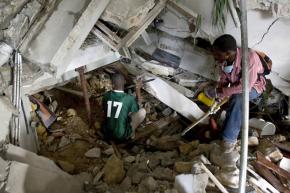Haiti’s hope amid the suffering
is co-founder of Sustainable Organic Integrated Livelihoods (SOIL), a non-profit organization dedicated to protecting soil resources, empowering communities and transforming wastes into resources in Haiti.
At the time of the Haitian earthquake, Kramer was at the SOIL house in Cap Haitien, with a group of students. Days later, she and other members of SOIL traveled to Port-au-Prince to help with relief efforts, where she wrote this report.
THIS AFTERNOON, feeling helpless, we decided to take a van down to Champs de Mars (the area around the palace) to look for people needing medical care to bring to Matthew 25, the guesthouse where we are staying, which has been transformed into a field hospital.
Since we arrived in Port-au-Prince, everyone has told us that you cannot go into the area around the palace because of violence and insecurity. I was in awe as we walked into downtown, among the flattened buildings, in the shadow of the fallen palace, among the swarms of displaced people, there was calm and solidarity.
We wound our way through the camp, asking for injured people who needed to get to the hospital. Despite everyone telling us that as soon as we did this, we would be mobbed by people, I was amazed as we approached each tent. People gently pointed us toward their neighbors, guiding us to those who were suffering the most.
We picked up five badly injured people and drove toward an area where Ellie and Berto had passed a woman earlier. When they saw her, she was lying on the side of the road with a broken leg, screaming for help. As they were on foot, they could not help her at the time--so we went back to try to find her.

Incredibly, we found her relatively quickly at the top of a hill of shattered houses. The sun was setting, and the community helped to carry her down the hill on a refrigerator door. Tough-looking guys smiled in our direction, calling out "bonswa, cherie" and "kouraj."
When we got back to Matthew 25, it was dark, and we carried the patients back into the soccer field/tent village/hospital, where the team of doctors had been working tirelessly all day. Although they had officially closed down for the evening, they agreed to see the patients we had brought. Once our patients were settled in, we came back into the house to find the doctors amputating a foot on the dining room table. The patient lay calmly, awake, but far away under the fog of ketamine.
Halfway through the surgery, we heard a clamor outside and ran out to see what it was. A large yellow truck was parked in front of the gate, and rapidly unloading hundreds of bags of food over our fence. The hungry crowd had already begun to gather, and in the dark, it was hard to decide how to best distribute the food.
Knowing that we could not sleep in the house with all of this food and so many starving people in the neighborhood, our friend Amber (who is experienced in food distribution) snapped into action and began to get everyone in the crowd into a line that stretched down the road. We braced ourselves for the fighting that we had heard would come, but in a miraculous display of restraint and compassion, people lined up to get the food, and one by one, the bags were handed out without a single serious incident.
DURING THE food distribution, the doctors called to see if anyone could help to bury the amputated leg in the backyard. As I have no experience with food distribution, I offered to help with the leg. I went into the back with Ellie and Berto, and we dug a hole and placed the leg in it, covering it with soil and cement rubble. By the time we got back into the house, the food had all been distributed and the patient Anderson was waking up.
The doctors asked for a translator, so I went and sat by his stretcher, explaining to him that the surgery had gone well, and he was going to live. His family had gone home, so he was alone. So Ellie and I took turns sitting with him as he came out from under the drugs.
I sat and talked to Anderson for hours as he drifted in and out of consciousness. At one point, one of the Haitian men working at the hospital came in and leaned over Anderson, and said to him in Kreyol: "Listen man, even if your family could not be here tonight, we want you to know that everyone here loves you. We are all your brothers and sisters."
Cat and I have barely shed a tear through all of this, the sky could fall, and we would not bat an eye. But when I told her this story this morning, the tears just began rolling down her face--as they are mine as I write this. Sometimes, it is the kindness and not the horror that can break the numbness that we are all lost in right now.
So, don't believe Anderson Cooper when he says that Haiti is a hotbed for violence and riots. It is just not the case. In the darkest of times, Haiti has proven to be a country of brave, resilient and kind people, and it is that behavior that is far more prevalent than the isolated incidents of violence.
Please pass this on to as many people as you can, so that they can see the light of Haiti, cutting through the darkness, the light that will heal this nation.
We are safe. We love you all, and I will write again when I can. Thank you for your generosity and compassion.
With love from Port-au-Prince,
Sasha


